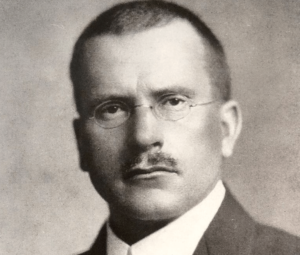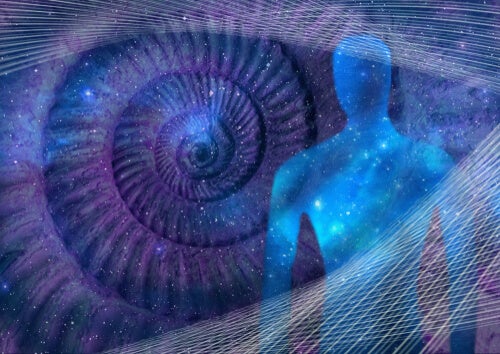Carl Jung: His Last Interview

This last interview with Carl Jung helps us understand the depths of his thinking, the foundation of his beliefs, and the ins and outs of his theories. Jung was a Swiss psychiatrist and psychologist. He was born in 1875. His disagreements and concerns regarding psychoanalysis led him to establish the school of analytical psychology. Jung was a student and collaborator of Sigmund Freud. However, the two disagreed over the establishment of Jung’s analytical school. Jung’s analytical psychology was strongly influenced by other branches of knowledge, such as anthropology.
On June 7, 1960, Georg Gerster conducted an interview with Jung for a Swiss radio show. It was Jung’s 85th birthday. The interview took on particular relevance almost a year later as Jung died on June 6, 1961.
Let’s delve a little deeper into the world of this rather strange yet fascinating 20th-century author.

Carl Jung and his strange vision of God
In the interview, Jung stated that nobody can escape religious phenomena. Indeed, the simplest of expressions that include the word God have a psychological meaning for those that use them.
The unknown, the inexplicable, or what transcends us has a special meaning on a psychological and anthropological level.
“We observe these religious manifestations, mainly in times of emergency, or in very emotional circumstances.”
-Carl Gustav Jung-
Archetypes
The concept of an archetype is closely linked to God. To understand this concept, you need to detach yourself from any ecclesiastical feelings you might have. This will depend on your culture or religion. However, Jung actually goes further and talks about a more emotional kind of sense. A sense that, in fact, goes back much further than you could ever imagine.
Indeed, archetypes are behavior patterns that are repeated throughout history. Like man’s need to find answers in their faith to the inexplicable, for instance. This forms part of a basic and unconscious psychological need.
“Such an archetype, such as the notion of a God or a supernatural power appears in highly emotional situations.”
-Carl Gustav Jung-
Moments of limitation
In the interview, Jung speaks of times when you’re dominated by your emotions. Fear and uncertainty are the most common.
It’s at those moments that you, spontaneously and without thinking, say a “prayer” and deliver it into the unknown.
Phenomena related to the soul
The interview with Carl Jung suggests important reflections concerning the soul. Indeed, the author speaks of “religious” phenomena as being phenomena of the soul. Furthermore, far from being taboo, they form an inescapable part of human nature.
Being rescued by your soul
If you find yourself in an emergency situation, your instinct comes to help you. At least, that’s what you call how you act, think, and feel in these situations. For Jung, instinct is always there. Furthermore, it’s automatically evoked, just as it is in other animals.
A psychic phenomenon
In the interview, Jung reveals that the phenomena of the soul shape the psyche. They form part of a system of instinctive modes of behavior. You can find several examples in everyday life:
- Uncertainty. When you really want something. Alternatively, when you’re worried and not sure of what’s going to happen. At these times, you’ll try everything to make things go your way. They might range from good luck charms to certain rituals, such as starting off on one particular foot or dressing in certain outfits.
- Danger. You go on the defensive and say prayers. You might make internal promises.
- Decisions. When you need to make a difficult choice that’s really important, your unconditional desires usually appear in your dreams.
“In a way, unconscious powers come to help us when our conscience is overwhelmed, subjugated.”
-Carl Gustav Jung-
Dreams according to Carl Jung
In the interview with Jung, you can see the differences he had with his teacher, Freud.
For Jung, dreams play a more complex role than just satisfying the unconscious. Instead, they have a social or guiding purpose. However, to comprehend them the relevant culture must also be understood.
A productive exchange with the unconscious
Far from simply satisfying dissatisfied desires, dreams can be your guide to a cure. Every psychologist encounters problems that they can’t solve. This is where the patient’s unconscious can manifest itself in their dreams and guide the therapy. For example, Jung mentions that, in many primitive societies, people experience lucid dreams with transcendent meanings.
An unlimited horizon
In the interview, Jung states that people often suffer from very biased and distorted views. He further claims that having such a skeptical perspective can mean you tend to neglect your sentimental sphere.
In these situations, suffering arises because you’re limiting your experience and paying little or no attention to your soul and your feelings. For Jung, if you deny your dreams, you’re silencing your soul.

Carl Jung: a critical vision of culture
Jung stands out in the world of psychology for not being particularly deterministic. Unlike his predecessors and successors, he didn’t limit the study of human phenomena to a single vision or method. In addition, Jung was quite critical when it came to analyzing our culture.
- Lack of connection with the unconscious. Our relationship with the incomprehensible has become taboo. Jung stated that we’ve lost the need to connect with the unknown.
- Breaking of the spiritual tradition. The intellectualism of the time abandoned spirituality. Today, spirituality is blamed for atrocities that were carried out in its name.
“We’ve been too persuaded by science of the nullity of human life.”
-Carl Gustav Jung-
Carl Jung: a man who never lost hope
The last interview with Jung concludes with a look at the solutions to the problems mentioned. Jung admits that he can’t change the way things have turned out. However, he hopes that we can start to live reflectively by questioning how far our certainties actually go.
This text is provided for informational purposes only and does not replace consultation with a professional. If in doubt, consult your specialist.








